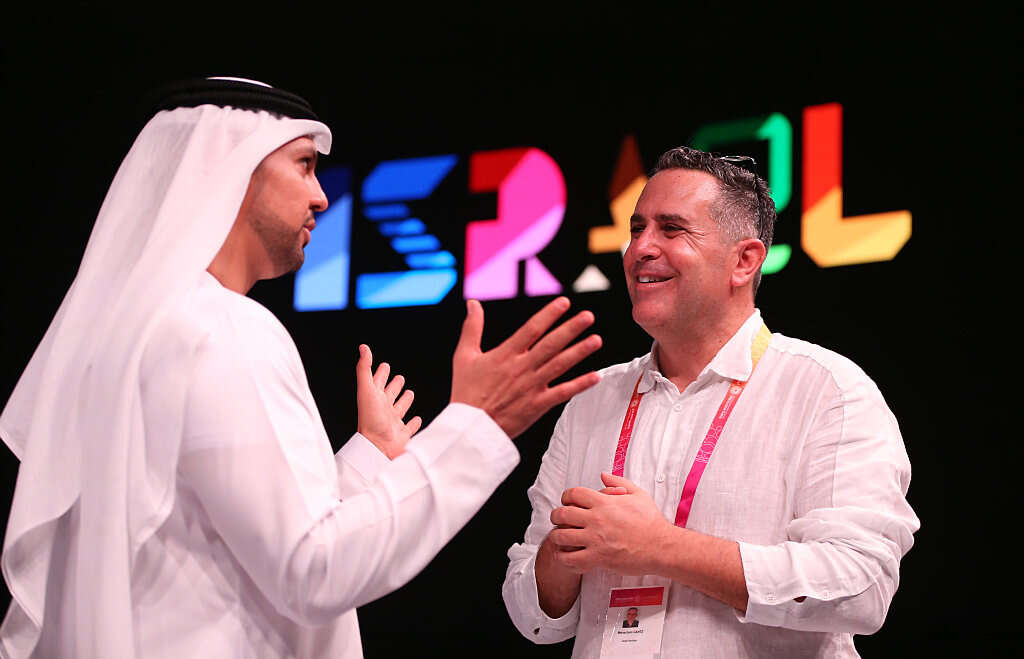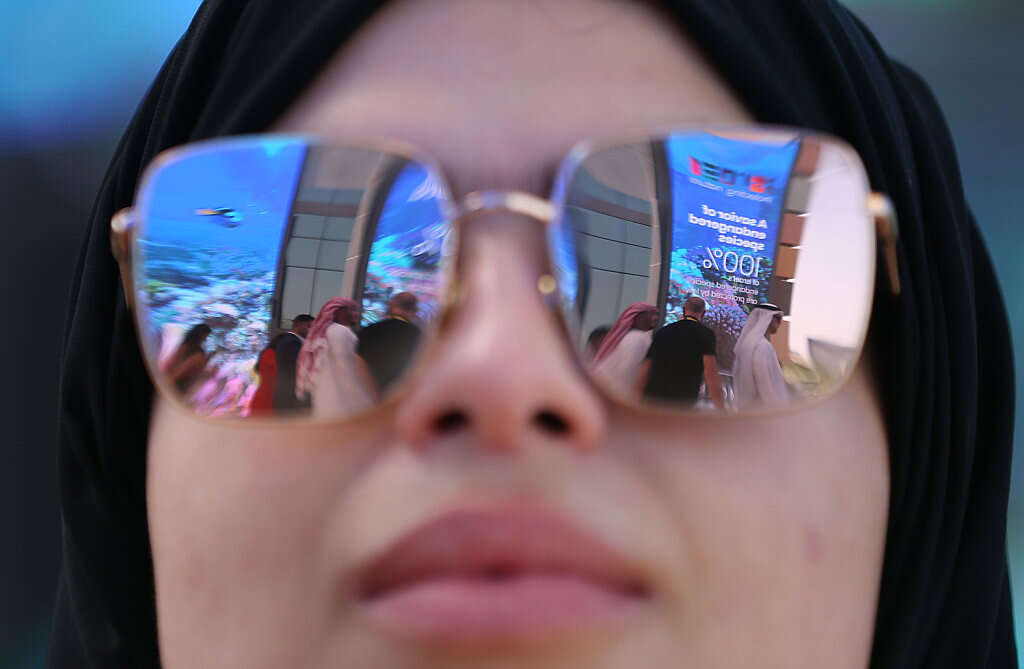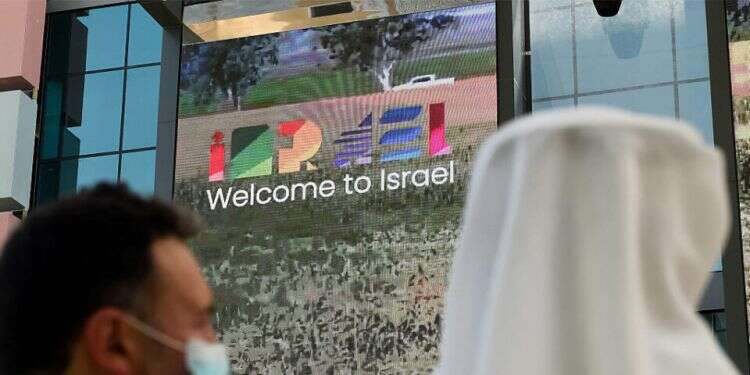No less than their political-diplomatic context, the Abraham Accords are, from the perspective of the Gulf States, an explosion in relation to the civilian-cultural relationship between the Gulf states and Israel. Practically, the strengthening of the channels of dialogue, like the extent of relations, is finding new expressions. In this regard, the work of the Foreign Ministry is quite striking: two years ago, it increased its involvement through its contribution in the civilian context of connecting between the nations and deepening the relationship between the Gulf states and Israel.
Follow Israel Hayom on Facebook and Twitter
The "Israel in the Gulf" Twitter page has around 95,000 followers – most of them from Saudi Arabia, the UAE and Bahrain (as well as the remaining Gulf states). By way of comparison, the "Israel in Arabic" page, which has been in operation since 2011, boasts around 445,000 followers. "Just so you can have a sense of scale, one year ago we had around 40,000 followers," Loreena Khatib from the Foreign Ministry's Digital Department says enthusiastically.
According to Khatib, "the nature of the responses, which are increasing in number, is positive and there have been numerous collaborations and interactions over the past year. People are aware of the importance of normalization and informing people, some of who know Jews but haven't been exposed to Israelis or to Israel, and this places an emphasis on the benefits to the two sides as a result of the agreement. By the way, over time we know that bloggers from the UAE and Saudi Arabia are sharing more and more of our posts. It's not a simple mission: Many of them still have negative opinions about Israel, but on the other side of the coin we see the influence our pages have on the issue."

Khateeb emphasizes the process: "The platforms were established even before the peace agreements, as an attempt to create discourse and dialogue between the nations, at a time when these connections were a dream. With the coming of the agreement, a discourse about Jewish festivals and Jewish tradition quickly emerged, we were able to celebrate a number of festivals and we did Shabbat together, and this encourages many more to take part. We are also trying to brand Israel anew in relation to coexistence between Jews and Arabs.
"As an Arab-Israeli, I was especially interested in the fact that most of them didn't know that around one-fifth of Israel's citizens are Arabs, and the message of coexistence that accompanies this: communities live alongside one another in Israel, just like they do in the Emirates. It can't be taken for granted and it has a cumulative effect – they want to come and visit Israel."
The Digital Manager at the Foreign Ministry, Yiftach Koriel, summarizes: "The Foreign Ministry is one of the world leaders in digital diplomacy. We operate the largest official network in Israel, which reaches 10 million followers, and in relation to the activities of Arab states it has a significant advantage because of the young people, who, unlike in the past, aren't worried about being active online. With digital means we are operating a new diplomatic vector that creates influence. Among other things, this is expressed in general sympathy for Israel, which is increasing in the Gulf."
WATCH! #TelAviv to the #BahaiGardens: #Israel in 360 at @expo2020dubai
The Israel pavilion at #Expo2020Dubai celebrates creativity, innovation and collaboration, and shows how collaboration leads to a better future for all. @michaldivon @UAEinIsrael pic.twitter.com/dsQQYbXFAs
— Khaleej Times (@khaleejtimes) October 13, 2021
Alongside the networks, the most significant highlight this year in the civilian context is Israel's participation in Expo Dubai – the largest exhibition in the world, which was launched at the start of the month. Here also the "civic" activities of the Foreign Ministry, which led the preparations even before the establishment of the Abraham Accords, is clear.
The Israeli pavilion at the exhibition will be open for around six months, and includes exhibits of Israeli innovation alongside displays that reflect Israel's values: heritage, culture, scenery and the diversity of its society. In an unmediated way, the pavilion promotes in an unmediated way what Israel can offer as a country, including among other things its abilities in the area of the "super technologies" – High-Tech.
"Beyond the clear diplomatic and economic levels, we saw here a rare opportunity to promote Israel as the state of the Jewish people, and all its aspects, to communities that had never been exposed to it," the Foreign Ministry's Elazar Cohen, Israel's commissioner to the Dubai Expo and pavilion project manager at the exhibition, explains.

According to him, "The Abraham Accords strengthened our involvement in the exhibition, in which we see a basis for wide-ranging cooperation with the UAE and with the rest of the world. Our participation in the Expo constitutes an important platform for advancing the relations that are currently being created. We are communicating with the countries of the world, among other things, via 'soft power' – something that is well-received in the UAE, in the context of collaboration on civil society issues: art, the economy, the environment, regulation and more."
As is known, years before the signing of the current agreements, there were communities of Jewish businesspeople from around the world who operated in the UAE, and also from Israel, with the local authorities allowing the community to hold prayers and meetings on Jewish holidays. After the signing of the agreement, Cohen confirms, the mutual interest of businesspeople from the two sides increased greatly.
"Many of them come for lengthy visits," Cohen says, "and the community increased in comparison to the same period last year, and it continues to develop. In parallel, there is extensive Israeli tourism in the UAE. In order to meet the special needs of religious people, there has been a significant increase in the supply of kosher food, synagogues, and even mikvehs. As a rule, the increased presence of Jews and Israelis in the UAE contributes to the development of trade and economic relations between the countries, and it is received happily and willingly."
Subscribe to Israel Hayom's daily newsletter and never miss our top stories!




